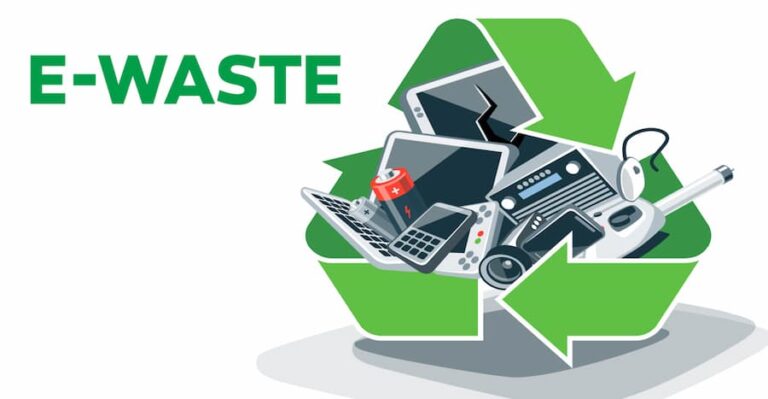Introduction
E-waste is the term used to describe thrown-away electronic gadgets like tablets, laptops, obsolete mobiles, and other equipment. Maintaining the environment and making sure that priceless materials found in these gadgets may be reused depend on responsible handling of e-waste. The several approaches of responsibly and ecologically friendly handling e-waste will be discussed in this article.
Best Practices for Handling E-Waste
Recycling Your Old Devices
Recycling your old electronics through approved e-waste recycling programs is the most conscientious approach to get rid of them. These initiatives are meant to safely disassemble and recycle electronic equipment, therefore guaranteeing appropriate handling of dangerous waste and recovery of valuable resources.
Many manufacturers of gadgets and stores run recycling programs for outdated models. Companies like Apple, Samsung, and Dell, for instance, provide trade-in schemes wherein you may have your old equipment recycled for free or returned for a discount on a new one. Likewise, many stores—including Best Buy—accept used gadgets for recycling; occasionally, they provide gift cards in return for your e-wasted items. It is not like a physical trash which requires skip hire Stretford, you may manage e-waste yourself by adopting a simple method.
Data Security: Wipe Your Devices Clean
Make sure your personal data is safely deleted from any old computer, tablet, or mobile phone you want to trash or throw away. This guards your privacy and helps against identity theft. Simply wiping files or resetting the device might not be enough as specialised technologies allow data to be recovered.
Here are some guidelines for safely wiping information off of your devices:
- For tablets and smartphones: perform a factory reset which wipes all of the device’s data. Using software meant for safe data erasing allows you to add more security.
- For computers: To prevent data recovery, use data destruction programs repeatedly rewriting the whole hard disk several times. If you are doubtful, you might choose to physically wipe the hard disk.
Eliminating any memory cards, SIM cards, or external storage devices can help to protect personal information.
Donate or Repurpose Old Electronics
If your gadget still runs, consider giving it instead of throwing it away. Working electronics are accepted by many charitable organisations to distribute among people in need such as community centres, schools, and low-income families. Giving your old computer, tablet, or cell phone will benefit others at the same time and lessen environmental effects.
Renovated gadgets can be a reasonably priced way for companies or educational institutions to supply technology to underfunded departments or staff members in demand.
Sell or Trade-In Your Device
If your current equipment is still in good operating order, you might be able to trade it in for credit or cash or sell it. You may sell your items to others using several internet sites like eBay, Craigslist, and specialist electronics resale websites. Manufacturers including Apple, Samsung, or Best Buy may also provide trade-in schemes whereby you may get store credit or a discount on new gadgets in return for your current ones.
Selling or trading in gadgets not only helps you to offset part of the cost of your new electronics but also helps to keep them out of the garbage stream.
Consider Refurbishing or Repairing Devices
Sometimes your old gadget could just require a repair or upgrade to increase its lifetime of usage. Refurbishing electronics—for example, changing the battery in a smartphone or the memory in a computer—can make them valuable once again. Many independent repair stores focus on updating or restoring outdated appliances.
If the gadget would be valuable to someone else but not to you, consider donating it to someone who might utilise it.
Support Extended Producer Responsibility (EPR) Programs
Extended Producer Responsibility (EPR) is a policy strategy whereby, after their life cycle ends, producers are obliged to take care of the disposal and recycling of their goods. E-waste environmental impact may be lessened by several nations and areas implementing E-pr initiatives.
Supporting companies engaged in E-PR initiatives or pushing for stricter laws can help the sector to embrace more environmentally friendly methods and guarantee responsible handling of e-waste.
Local E-Waste Recycling Events
Many towns set up e-waste collecting activities or provide specific e-waste recycling facilities where people could drop off obsolete devices for appropriate disposal. To learn whether such initiatives are accessible in your region, visit local government websites or community groups. Many times free, these activities guarantee responsible recycling of devices.
Conclusion
Minimising the environmental and health effects of e-waste depends on processing it correctly. The fast development of technology has produced an ongoing cycle of updating and disposal of electronic equipment. But using conscientious habits like recycling, donating, fixing, or reusing outdated devices, assist to lower the rising e-waste load and benefit the surroundings. Consumers, companies, and governments all have roles to help to control e-waste. Responsibly recycling our old mobiles, tablets, and laptops will help us to save priceless resources, stop dangerous pollutants from polluting the environment, and advance the creation of a circular economy supporting sustainability. Also read more blogpedia.co.uk interesting articles.

1 Comment
Pingback: Cap Pack: Capacitor Packs in Modern Electronics